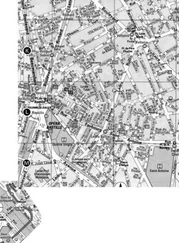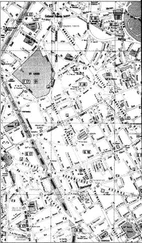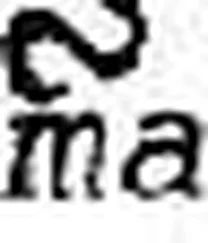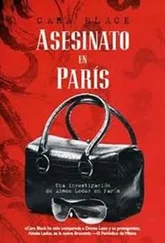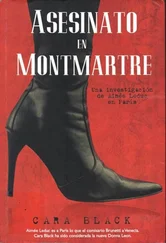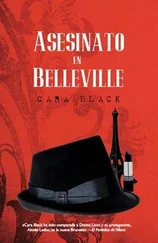A washing-machine advertisement covered one side. On the other, a mother, sweater draped around her shoulders with sleeves knotted, strolled hand in hand with a child in the Palais Royal garden. The caption read, “Arpége for the active woman—for every part of her life!”
Under the caption was written in ballpoint pen: “Like Amy, like us … she loved that sandbox.”
Below that, Aimée saw skillful cartoons of a pudgy mouse with long whiskers bordering the bottom of the page.
A dagger went through her heart. Her “Emil,” her stuffed mouse! The ragged little doudou she had hugged to sleep every night. For years. How would anyone know this but her mother?
Aimée emptied the envelope. That was all. She looked at the envelope again. The name B. de Chambly written in pencil was visible in the lower right-hand corner.
“What’s this?”
“Her name,” Jutta Hald said.
“What does ‘B.’ stand for?”
“I forget,” Jutta Hald said.
Not only her language but everything about Jutta Hald seemed stilted, forced.
“Tell me about her,” Aimée said. She pulled Miles Davis closer.
“I was transferred. Later, I heard she’d been released.”
“Released and then?”
“The trail leads to you.” Jutta Hald crossed her spindly legs.
“Trail?”
Jutta Hald looked around again, surveying the faded eighteenth-century murals on the twenty-foot ceilings.
“How do you keep this place clean?” She didn’t wait for an answer, but wiped her palm on the table. “You don’t.”
Not only was the woman rude, she’d come for something and Aimée didn’t know what. Shouldn’t it be the other way around, wasn’t she supposed to give information to Aimée?
“You’ve lived here a long time, haven’t you?”
She didn’t like the woman’s manner or anything about her.
“Instead of offering me information,” Aimée said, “you seem to want something, Madame Hald. What is it?”
The woman’s pale face cracked into a huge and disconcerting smile. She wet her fingers, tamped the cigarette out between them, and put the stub in her pocket. “No one’s called me Madame Hald in years.” Jutta Hald shook her head, still smiling.
For a moment Aimée thought she looked human. “Tell me about her,” she repeated.
“I’m a little short of cash right now.”
“Maybe you just found this piece of paper, just heard some stories….”
“She was released in 1977; she must have come back here or gone to the cemetery.”
Aimée had been in the lycée then. No, she’d been an exchange student in New York! Aimée grasped the table edge and took a deep breath. This woman spoke in riddles.
“What are you talking about?”
Jutta Hald looked down. Aimée wondered if she was assessing the carpet’s price. “What do you want?” she demanded.
“You saw the proof,” Jutta Hald said. “Fifty thousand francs.”
Fifty thousand francs! That was office rent for six months! “What do I get for it?”
“I have more things,” Jutta said. “Her things.”
“Things like her photo? Or a location where I can find her?” Aimée asked, hoping she didn’t sound as desperate as she felt.
“Drawings,” she said. “There’s an anklet chain, an address book.”
“ Her address book?”
“Lots of foreign addresses in it,” Jutta said, taking a deep breath. “ Aah , free air, like I remember. So sweet after twenty years.”
“But I don’t have that kind of money.”
In theory she did, but Leduc Detective’s assets consisted of a bloated file of accounts receivable that René was trying to collect. He’d had little success with their big corporate clients, who took several months to pay up.
“I’m sure you can find it, if you want to,” Jutta Hald said, jotting something in her notebook, then snapping it shut. “I came straight from prison, just to see you.” She looked out the French doors that stretched from the floor to the ceiling. Then she picked up her bag and took another look around the room.
“You know,” Jutta Hald said, “a little dusting and cleaning would improve this place.”
Aimée bit back her reply.
“Guess you’re not interested. I’m leaving.”
Aimée hesitated. “Non….” She didn’t want the woman to leave. She had an urge to entreat Jutta Hald to stay, to ask what her mother had said about her.
Jutta Hald’s eyes darted around the apartment. Her long fingers pinched and worried the leather bag handle.
Her fidgeting made Aimée uneasy.
“Think about it,” Jutta Hald said. “Maybe when your mother came back to your apartment … she left something?”
Wouldn’t her father have told her? Could her mother have come and gone without wanting to see Aimée, her daughter?
“This should convince you,” Jutta said, pulling out a small bound notebook from her bag. Aimée saw a faded blue cover lettered in fine script: Stories of Emil’s Life: a Royal Mouse in the Louvre .
Her heart caught.
“I believe she wrote this for you.”
Something cracked inside Aimée. And those long-ago afternoons flowed back to her, afternoons spent together making up Emil’s story, writing down lists of foods he ate, games he played, and pretending he slept in a matchbox.
“Look,” Jutta Hald said, thrusting the notebook into her moist palms.
Aimée’s hands shook as she grasped the musty cover. Afraid to drop it, she stopped, took a breath, then slowly opened the book.
The first page read, “For Amy.”
“How did you get this?”
“No questions.”
For a moment, Aimée was a little girl again, on her tiptoes tugging her maman ’s skirt, trying to see what she drew. Always out of reach.
With her forefinger and thumb she gingerly turned the first page and read: “Chapter One—How Emil Came to Be Born on King Henri’s Throne.”
“You’ve seen my proof,” Jutta Hald said. “Now admit it, she owes me my share.”
“Share … what do you mean?”
Jutta Hald’s lip curled. To Aimée’s horror, she grabbed the book back.
“Wait, please,” Aimée said. “I’ll get the money. Please, be fair.”
“Life’s not fair … then you die,” Jutta Hald said. “Think back. Didn’t your mother ever send you presents, little boxes or keys … maybe drawings?”
“If she did,” Aimée paused, saddened, “I never saw them.” She knew her father would have destroyed them, just as he had destroyed everything else that had to do with her mother.
Jutta dabbed a slight sheen of perspiration from her forehead with a handkerchief. “Pills,” she said. “Awful ones, they make me pee all the time.” She shook her head. “Where’s your bathroom?”
Aimée showed her. She took a long time before emerging.
“Tell me about my mother,” Aimée asked once more. “About the terrorism.”
“Now you’re speaking with negotiation in mind, ja? We can share.”
“D’accord,” Aimée said. Let Jutta Hald think what she wanted.
“She was a courier,” Jutta Hald said.
“A courier?”
“That’s the polite term,” Jutta Hald said. “A drug mule describes it better.”
“My mother, involved with drugs?” Aimée tried to keep her surprise in check. “From where and to whom?”
“Mostly Morocco,” Jutta said, then shrugged. “Some hashish connection. But I knew her before we were sent to prison.”
“How did you know her?” Aimée asked.
“Back then we were all part of a loose network,” said Jutta Hald. “Rumor was her group shifted weapons, set up safe houses and printing presses for the Haader-Rofmein gang.”
Читать дальше


